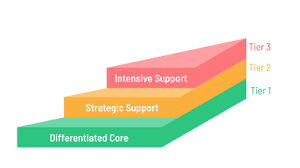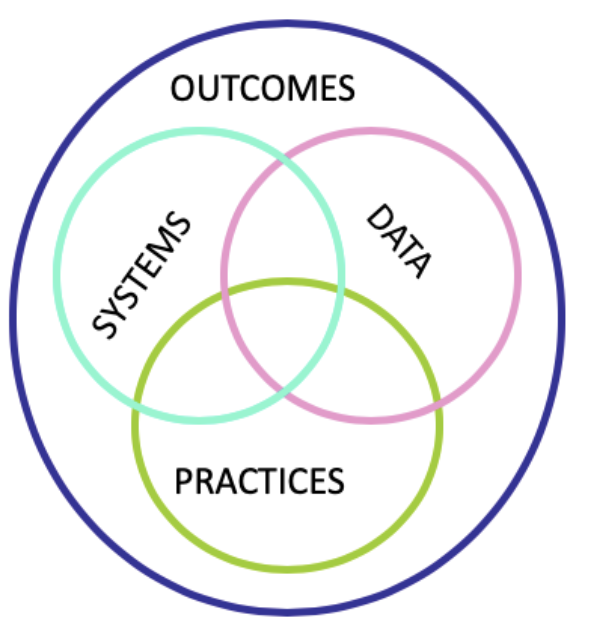What is MTSS in Rhode Island?
Introduction
A Multi-Tiered System of Supports (MTSS) is a systemic, continuous school improvement framework in which data based decision-making is practiced across all levels of the educational system for supporting students. The framework of MTSS is a “way of doing business,” which utilizes high quality evidence-based instruction, intervention, and assessment practices to ensure that every student receives the appropriate level of support to be successful promoting equity. A Multi-Tiered System of Supports helps schools and districts to organize resources through alignment of academic standards, behavioral expectations, and social-emotional competencies implemented with fidelity and sustained over time, in order to enable every child to successfully reach his/her fullest potential.
|
Definition (2019) In Rhode Island, a Multi-Tiered System of Supports (MTSS) is defined as: a framework for school improvement that ensures that all students are supported for meeting academic, behavioral, and social emotional outcomes. All students means all students - including multilingual and differently abled students. In a MTSS, all students have equitable access to strong, effective core instruction using high quality curriculum and universally designed and differentiated instructional practices at Tier 1, evidence based group interventions at Tier 2, and intensive individualized interventions at Tier 3. |
 |
|---|
MTSS RI Components
|
The Essential Components are:
When schools and districts fully-embrace and embed these components into their organizational structure, systems align and substantive improvement can occur. An enabling context is established so that systems-level and stakeholder-level innovations can be initiated, implemented with fidelity, and maintained successfully over time. The goal and primary purpose of MTSS RI implementation is to improve outcomes for students, using:
|
 |
|---|
Creating a Problem Solving Culture
By systematically evaluating and analyzing student progress through ongoing universal screening and progress monitoring, school systems are able to more efficiently use their available resources and to improve student outcomes. This process allows educators to problem-solve less severe educational challenges in the general education environment, preserving additional resources for students who require more targeted and intensive instruction/ intervention in order to achieve educational benchmarks. This type of structured problem-solving process meets the mandates of both ESEA (2002) and IDEA (2004) and contributes to legislated considerations in the Every Students Succeeds Act/ESSA (2015). MTSS RI also supports the Rhode Island educational regulations put forth in the Basic Education Plan (e.g. data driven decision making, access to high quality core, interventions), Secondary Regulations (e.g. screening, evidence based intervention), and Regulations Governing the Education of Students with Disabilities (e.g. Coordinated Early Intervening Services [CEIS] and SLD identification).
MTSS RI implementation is dependent upon effective use of data and information to make decisions about student level and system-level progress. In order for districts and schools to function as a problem-solving culture, a shift in thinking must take place. The shift is the recognition that student achievement comes from a shared responsibility of all stakeholders to ensure an appropriate fit of curriculum, instruction, and environment that enables student learning. Effective leadership facilitates the building of systems and atmosphere to support and encourage educational stakeholders to problem solve at all levels and more efficiently meet student needs.
Leadership for MTSS RI
Shared leadership within MTSS RI exists at all levels (school, district, region, and state). For MTSS implementation to be successful, it is critical to establish leadership teams at each level of the system; these teams will ensure effective implementation across all levels of the system (district, school, classroom, grade/content, and individual student). Initially, the team creates a common vision and establishes a common language in order to clarify the purpose and desired outcomes. Through data-based problem solving and decision-making, system support needs are identified, and plans are constructed. Leadership teams engage in ongoing review and evaluation of progress data to determine how to best allocate funding and available resources. Implementation, on the other hand, is the responsibility of all.
Implementation is a Science
Effective implementation of an MTSS framework—building both individual stakeholder capacity and the system’s collective capacity—takes time. In order to reach full implementation, implementers should expect the process to take 2-4 years (longer in secondary schools) to then build to sustainability. An MTSS framework systematizes: administrative and distributed leadership, teaming structures, personnel roles, use of a problem-solving process, coaching, operating routines, embedded and continuous personnel development, and action planning. The Office of Student, Community, and Academic Supports at RIDE provides support for MTSS through the RI Systems of Support. In the past, support was primarily through face-to-face training and technical assistance - limiting scale up and sustainability. The current focus is building more robust blended, online offerings as part of the Educator Course Network to increase offerings with a variety of models: self-paced, facilitated, and online communities of practice.
Has the information here challenged your current understanding of MTSS?
We encourage you to deepen your understanding of a Multi-Tiered System of Supports by enrolling in BRIDGE-RI's MTSS Overview course. This two hour course goes into depth to establish common language and a conceptual understanding of MTSS so that all Rhode Island educators are on the same page. Want to share this knowledge with others? Use our handy reference guide to help others learn the basics of MTSS.
